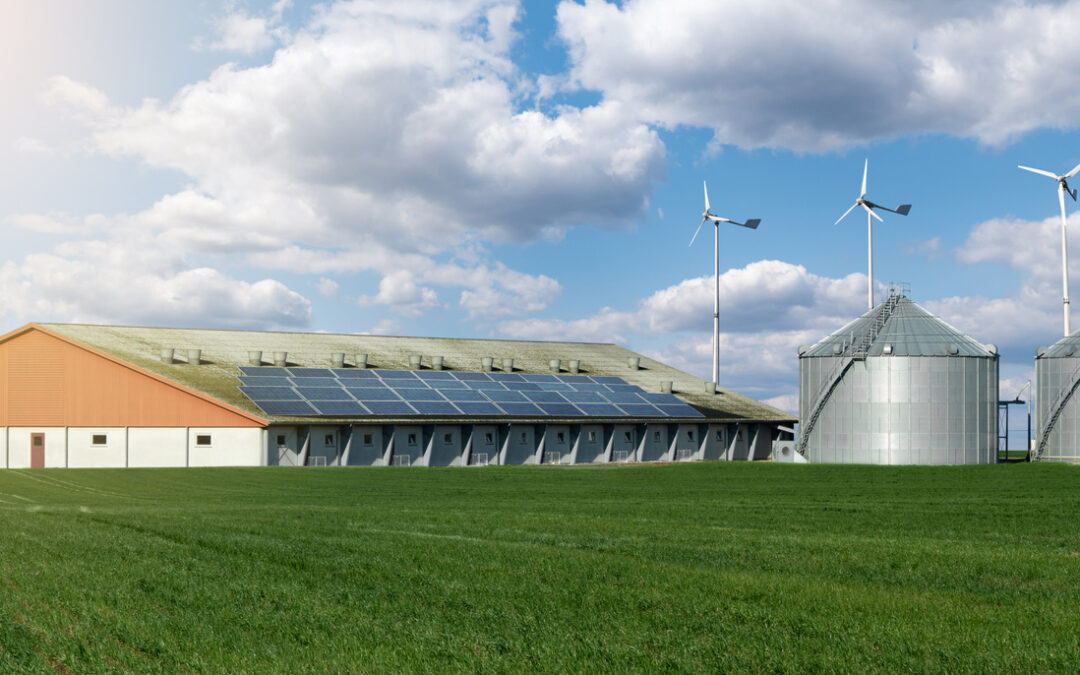In recent years, there has been a growing focus on reducing carbon emissions and transitioning towards cleaner, more sustainable energy sources. For farmers, especially those involved in the production of corn and soybeans for biofuel, meeting carbon intensity requirements has become a pressing concern. Legislation such as the Renewable Fuel Standard (RFS) sets specific thresholds for carbon emissions, prompting farmers to seek innovative solutions to minimize their environmental impact. In this blog, we’ll explore how agricultural solar energy can play a crucial role in helping farmers meet these carbon intensity requirements, while also contributing to the broader goals of sustainability and renewable energy in Minnesota and beyond.
The Importance of Carbon Intensity Requirements
The Renewable Fuel Standard (RFS), established by the Environmental Protection Agency (EPA), mandates the blending of renewable fuels, such as ethanol and biodiesel, into the nation’s transportation fuel supply. To qualify for these programs, biofuel producers must meet certain criteria, including a specified carbon intensity threshold. This threshold measures the amount of greenhouse gas emissions produced throughout the lifecycle of the biofuel, from cultivation to distribution.
With increasing concerns about climate change and the environmental impact of traditional farming practices, meeting these carbon intensity requirements has become a priority for farmers. Failure to comply with these regulations can result in penalties and disqualification from renewable energy programs, affecting both the financial viability of farms and their ability to contribute to sustainable fuel production.
Solar Energy as a Solution
Solar energy presents a promising solution for farmers seeking to reduce their carbon footprint and meet carbon intensity requirements. Unlike fossil fuels, which release large amounts of greenhouse gasses when burned for energy, solar power generates electricity through the conversion of sunlight, producing zero emissions in the process. By harnessing solar energy, farmers can significantly reduce their reliance on fossil fuels and mitigate the carbon emissions associated with traditional energy sources.
Moreover, solar energy systems can be integrated seamlessly into existing farm operations, providing a reliable and sustainable source of power for irrigation, machinery, and other agricultural activities. With advancements in solar technology and decreasing installation costs, solar panels have become increasingly accessible to farmers of all sizes, from small family farms to large-scale agricultural operations.
Solar Energy’s Many Agricultural Applications
Solar power can be seamlessly integrated into various aspects of farm operations, leading to increased efficiency and environmental sustainability.
- Machinery and Equipment: Many farms rely on a wide range of machinery and equipment powered by electricity or fossil fuels. By switching to solar energy to power farm equipment, such as tractors, combines, and grain dryers, farmers can reduce their carbon footprint and operating costs. Additionally, solar-powered equipment can provide greater flexibility and reliability, as it is not dependent on external fuel sources or grid connectivity.
- Livestock Operations: Solar energy can also be utilized to power various aspects of livestock operations, such as lighting, heating, and ventilation systems. Solar panels installed on barns or other structures can generate electricity to meet the energy needs of livestock facilities, enhancing animal comfort and welfare while reducing energy costs for farmers.
- Energy Storage: With advancements in battery storage technology, farmers can now store excess solar energy generated during the day for use during periods of low sunlight or high energy demand. Battery storage systems allow farmers to maximize the value of their solar investment by providing a reliable source of electricity even when the sun is not shining. This can help ensure uninterrupted power supply for critical farm operations and reduce reliance on grid electricity during peak demand periods.
By leveraging solar energy across various aspects of farm operations, farmers can achieve greater energy independence and meet environmental sustainability requirements. As solar technology continues to evolve and become more affordable, it presents an increasingly attractive option for farmers looking to enhance the efficiency and sustainability of their operations.
Minnesota’s Commitment to Renewable Energy
Minnesota has emerged as a leader in renewable energy, with ambitious goals to transition to clean, sustainable sources of power. The state’s Renewable Energy Standard (RES) requires utilities to generate a significant portion of their electricity from renewable sources, such as wind and solar, by specific target years. Additionally, initiatives such as the Solar*Rewards Program and the Community Solar Garden program have incentivized the adoption of solar energy across the state.
As Minnesota continues to prioritize renewable energy and sustainability, it is likely that regulations related to carbon intensity requirements will become more stringent. Farmers who proactively invest in solar energy now will not only meet current regulatory requirements but also position themselves for future compliance and success in a rapidly evolving energy landscape.
Furthermore, by embracing solar energy, Minnesota farmers demonstrate their commitment to environmental stewardship and sustainable agricultural practices. This proactive stance can enhance the public perception of their operations, attract environmentally conscious consumers, and open up new market opportunities.
Invest in Solar for a Sustainable Future
Solar energy offers a promising pathway for farmers to meet carbon intensity requirements and contribute to a more sustainable agricultural sector. By harnessing the power of the sun, farmers can reduce their reliance on fossil fuels, minimize carbon emissions, and align with renewable energy goals at both the state and national levels. As Minnesota continues to advance its commitment to renewable energy, investing in solar energy now can position farmers for long-term success while fostering environmental stewardship and resilience in the face of climate change.
Cedar Creek Energy is here to assist farms in meeting sustainability requirements by installing solar energy solutions tailored to their specific needs. With our expertise in solar panel installation and management, we help farmers navigate the complexities of renewable energy adoption, ensuring compliance with regulatory standards while maximizing the benefits of solar power. By partnering with Cedar Creek Energy, farms can achieve greater energy independence, reduce their carbon footprint, and contribute to a more sustainable future for agriculture in Minnesota. Contact our team to request your free solar bid.

